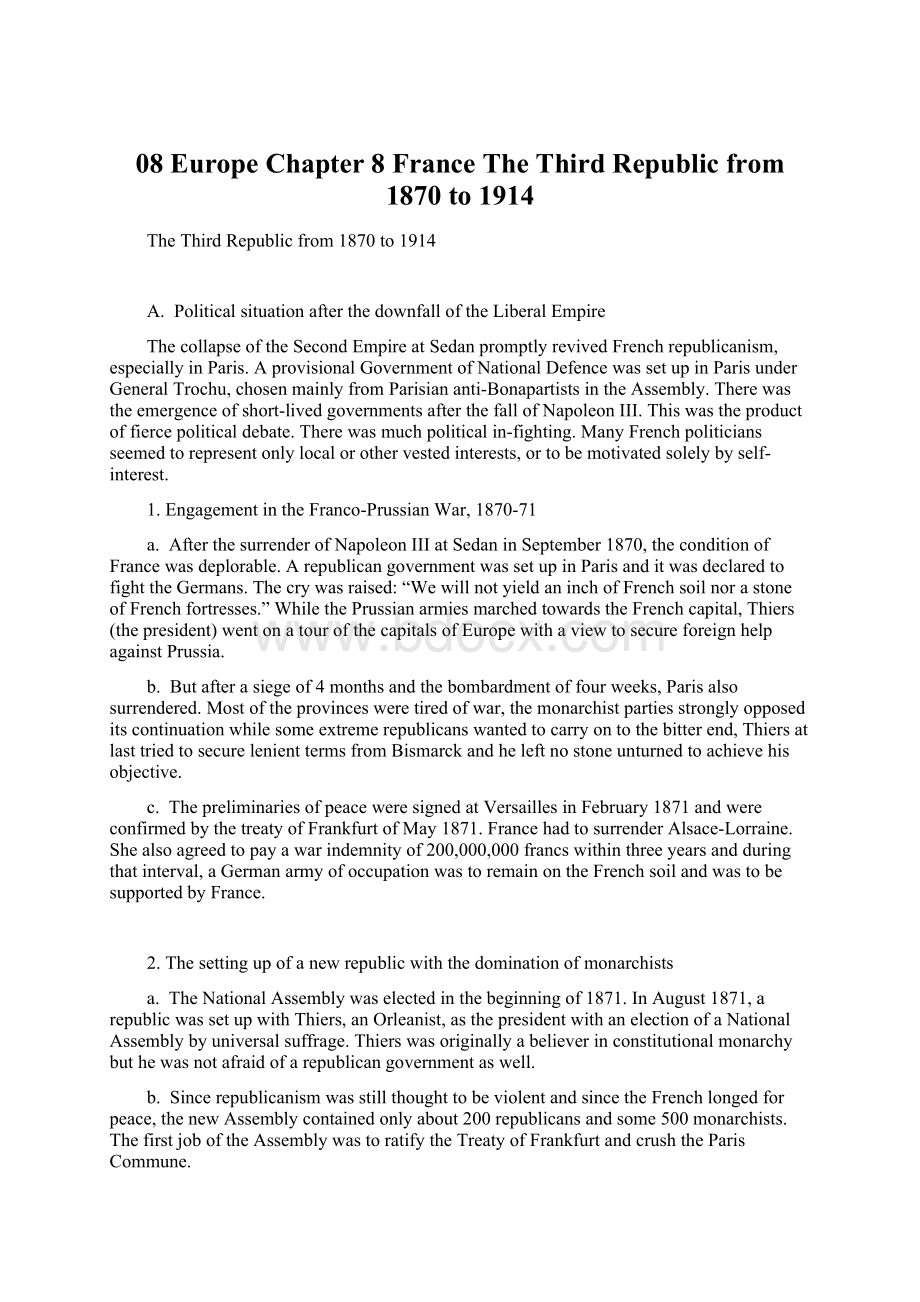08 Europe Chapter 8 FranceThe Third Republic from 1870 to 1914Word文件下载.docx
《08 Europe Chapter 8 FranceThe Third Republic from 1870 to 1914Word文件下载.docx》由会员分享,可在线阅读,更多相关《08 Europe Chapter 8 FranceThe Third Republic from 1870 to 1914Word文件下载.docx(15页珍藏版)》请在冰豆网上搜索。

1.EngagementintheFranco-PrussianWar,1870-71
a.AfterthesurrenderofNapoleonIIIatSedaninSeptember1870,theconditionofFrancewasdeplorable.ArepublicangovernmentwassetupinParisanditwasdeclaredtofighttheGermans.Thecrywasraised:
“WewillnotyieldaninchofFrenchsoilnorastoneofFrenchfortresses.”WhilethePrussianarmiesmarchedtowardstheFrenchcapital,Thiers(thepresident)wentonatourofthecapitalsofEuropewithaviewtosecureforeignhelpagainstPrussia.
b.Butafterasiegeof4monthsandthebombardmentoffourweeks,Parisalsosurrendered.Mostoftheprovincesweretiredofwar,themonarchistpartiesstronglyopposeditscontinuationwhilesomeextremerepublicanswantedtocarryontothebitterend,ThiersatlasttriedtosecurelenienttermsfromBismarckandheleftnostoneunturnedtoachievehisobjective.
c.ThepreliminariesofpeaceweresignedatVersaillesinFebruary1871andwereconfirmedbythetreatyofFrankfurtofMay1871.FrancehadtosurrenderAlsace-Lorraine.Shealsoagreedtopayawarindemnityof200,000,000francswithinthreeyearsandduringthatinterval,aGermanarmyofoccupationwastoremainontheFrenchsoilandwastobesupportedbyFrance.
2.Thesettingupofanewrepublicwiththedominationofmonarchists
a.TheNationalAssemblywaselectedinthebeginningof1871.InAugust1871,arepublicwassetupwithThiers,anOrleanist,asthepresidentwithanelectionofaNationalAssemblybyuniversalsuffrage.Thierswasoriginallyabelieverinconstitutionalmonarchybuthewasnotafraidofarepublicangovernmentaswell.
b.SincerepublicanismwasstillthoughttobeviolentandsincetheFrenchlongedforpeace,thenewAssemblycontainedonlyabout200republicansandsome500monarchists.ThefirstjoboftheAssemblywastoratifytheTreatyofFrankfurtandcrushtheParisCommune.
3.Internalunrest:
ParisCommune
InMarch1871aclashoccurredbetweenthecitizensofParisandmilitaryforceswhenthemilitarytriedtocollecttheartilleryatMontmartrewhichhadbeenusedtodefendthecityagainsttheGermans.SeverefightingtookplaceinParis.On18thMarchradicalsocialistsledbyDelescluzedeclaredtheActsoftheVersaillesParliamentnullandvoid,proclaimedtheCommuneandranuptheredflag.
a.ReasonsfortheParisCommune
i.Refusaltoacceptdefeatandthepeaceterms:
SomeFrenchmendidnotwanttoacceptdefeat,includingGambetta(arepublican)whocampaignedforacontinuationofthewar.ThisrefusalwasinpartaprotestofcivicprideinParisagainstthehumiliationofdefeat.Also,manyFrenchmendislikedthefactthatthePrussiansweretobepermittedtomakeanofficialentryintoFrance.
ii.Theroyalistgovernmentanditsmeasures:
ParisiansfearedapossibleroyalistsrestorationanddislikedthedecisiontomovetheAssemblytoVersailles,asthisseemedtothemtohaveadistinctlyroyalistflavor.Theyhadsufferedterribleprivations,includingseverehunger,duringthesiege.Thierslaterevenaddedtheireconomictroubles,deterioratingmoralebyaskingpeopletopaybackallrentsanddebtsinfullwithinteresttolandlords.Thiswasdifficultforthepoorerclassesatatimeofwidespreadunemployment.TherewerefurtherdiscontentduetotheterminationofwartimepaytoanddisarmamentofParisNationalGuard.ThiersorderedtroopsintoParistocarryoutthismeasure.
b.Objectivesoftherebellion
i.ThediversecollectionofMarxist,socialist,anarchistandJacobinrevolutionarieshadnoclear-cutprogramme.However,theaimoftheCommune,accordingtoadeclarationon19thApril,wasthatFrancewouldbecomeavoluntaryandspontaneousFederationofCommunes.Eachonewouldcontrolitsownbudget,policyandNationalGuard.ThisfederalschemereflectedtheParisianyearningfordecentralisationandmunicipalautonomy.
ii.Itwasanti-German,republicanopposingtowealthybourgeois,aristocratsandclergy,infavourofthegovernmentcontroluponprices,wagesandworkingconditions.
iii.Itwasalsoanationalistrebellion,aprotestagainstthesurrendertotheGermans,fromwhichdevelopedtheCommunard’sdesiretoreconstructFrance.Thatreconstructionshouldbeintheinterestsofthemasses.
iv.Itwasthustosomeextentasocialistprotest,aworkers’movement,reachingbacktotheJuneDaysof1848.Butitwasmorethanthat:
itwasessentiallyParisianandessentiallyFrench,aconsequenceofthecity’shumiliationatthehandsoftheGermans,andtheCommunardsincludednotonlysocialistsandcommunists,butpetti-bourgeosieradicals.
c.Result
i.ThespiritofrevoltspreadalloverthecityanditdevelopedintoawarbetweenParisontheonesideandtheNationalAssemblyatVersaillesontheother.TowofthegeneralsotheVersaillesgovernmentwerecapturedandshotbytherebels.ThegovernmentforceswerewithdrawnfromParisbyThiersandthecitywasleftentirelyinthehandsoftherebelswhosecuredcompletecontroloverthesame.
ii.SinceThiersregardedtheParisCommuneasathreattonationalunity,theCommunewasfinallysuppressedin1871underMacMahon,asupporteroftheBourbons.ItmarkedtheendofParisianeffortstodictatethesystemofgovernmentinFrance.Manyrebels,includingmanyradicals,wereimprisoned,exiledorputtodeath.
iii.AfterthesuppressionoftheParisCommune,MacMahonwaselectedPresidentin1873byapredominantlyroyalistassembly.In1875theNationalAssemblywashoweverdissolvedbecauseithadgivenbirthtothenewconstitution.
d.Significance
i.ItloweredFrenchprestigeabroad:
EuropeanpowersbecamesuspiciousofrepublicanFrance,whichhadbeenestablishedonlyafterbitterdomesticupheaval.
ii.Itincreasedthebitternessbetweensocialclasses:
Whenleft-wingradicalismincreasedinthe1880stheworkerswerelessinclinedthanformerlytosupportrepublicanism,whichtothemhadbesomeassociatedwithrulebythemiddleclass,thegroupwhichhadtakensuchheavyrevengeontheCommunein1871.
iii.ItledtoafirmerfoundationfortheRepublic:
Left-wingradicalismwaseradicatedasaforcefornearlyadecade,sincemanyoftheextremistshadbeeneitherexiledorexecuted.Francehadbeenunderarepublicangovernmentthatamovementforthesuppressionofprivatepropertyhadbeensubdued.Moderationbecamethekeynoteoffuturegovernment.Thusmanypotentialmonarchistsupporterswerewonovertorepublicanism.
iv.TerminationofParis’sinfluence:
Parisceasedtoexertthepoliticalinfluencethatithadpreviously.Thedyingflickerofthetraditionofthebarricadesof1789and1848hadbeenshownintheactivitiesoftheCommune.
v.Growthofsocialism:
ThetemporaryexpulsionofsocialistandCommunistmovementsfromFrancecontributedtothegrowthofsocialismelsewhereinEurope.
4.Partypoliticsfrom1875to1914
Inthe1870sthemainpoliticalstruggleinFrancewasthatbetweenrepublicansandmonarchist.Ofsome10millionelectorsthemajoritywereruralandconservative.
--TheRepublicanpartywhichGambettadidmuchtocreateappealedtopeasantproprietorsandsmallbusinessmen.
--Theradicalwing,theOpportunistandRadicals,whoappealedtothepeasantryandtothemiddleclass.
--Ontherightwing,divisionsremainedbetweenthevariousmonarchistsandBonapartists,butstrongsupportalsoexistedfortheCatholicChurch.
--aSocialistLabourPartywasfoundedin1879,butitbecamefragmentedwhichweakenedthelabourmovement.
So,nosinglegroupcouldgainthemajoritysupport.Notuntilaleft-wingcoalitionunderReneWaldeck-Rousseaucametoofficein1899,didaFrenchmoderategovernmentsurviveforthreedecades.
B.EconomicsituationafterthefallofLiberalEmpire
1.Populationincreaseofeconomy
a.ComparedwiththeGermanReichtheFrencheconomygrewslowlyintheperiodfrom1871to1914,andthepopulationhardlyincreasedatall.NeverthelesstheFrenchvolumeoftraderemainedtwicethatofRussiathroughouttheperiod,anditcontinuedinitsturntorunatalmosthalfthatofBritain.
b.France’surbanpopulationalmostdoubledbetween1871and1914,bringingacorrespondinginterestinlabourorganizationsandsocialism,butstilllessthanhalfofthepopulationasawholelivedintowns.ThestrongruralelementinFrenchsocietystrengthenedtheforcesofconservatism.
2.Heavyblowtoeconomy
DuetotheTreatyofFrankfurtaftertheFranco-PrussianWar1870-71,FrancesufferedgreatlyfromindemnityandthelossofAlsasce-Lorraine.ThesetwosettlementsstruckablowattheFrencheconomyaswellasatFrenchpride,thoughtheformerwassettledeasilybytheprosperouseconomycreatedundertheThirdRepublic.
C.MajordomesticworksoftheThirdRepublictoconsolidatethegovernment
1.SuppressionoftheParisCommune(referstothepartofinternalunrest:
ParisCommune)
2.Militaryrecoverymeasures
In1872anewarmylawwasproclaimed.TheFrencharmywasreorganisedonthePrussianmodel.Aco